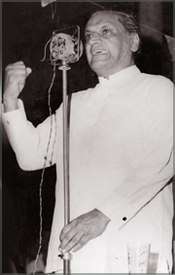Hector Kobbekaduwa
| Hon. Hector Kobbekaduwa | |
|---|---|
| හෙක්ටර් කොබ්බෑකඩුව | |
 | |
| Minister for Agriculture and Lands | |
|
In office 1970–1977 | |
| Prime Minister | Sirimavo Bandaranaike |
| Preceded by | M. D. Banda |
| Succeeded by | Lionel Senanayake |
| Member of the Sri Lanka Parliament for Yatinuwara | |
|
In office 1970–1977 | |
| Preceded by | S. S. Abeysundara |
| Succeeded by | S. S. Abeysundara |
| Majority | 5,493 (1970) |
| Personal details | |
| Born | 19 August 1916 |
| Died | 18 September 1983 (aged 67) |
| Nationality | Sri Lankan |
| Political party | Sri Lanka Freedom Party |
| Occupation | Politician |
| Profession | Advocate |
Hector Senarath Rajakaruna Bandara Kobbekaduwa (29 August 1916 - 17 September 1983) was a Sri Lankan politician and lawyer. He was the Sri Lanka Freedom Party candidate in the Sri Lankan presidential election, 1982, which he lost and the Minister for Agriculture and Lands from 1970 to 1977.
Early life and education
Born to a prominent family from Yatinuwara, his father was Dr Tikiri Banda Kobbekaduwa, the first British qualified physician from Kandy and his mother was Sangamitta Dullewe Kumarihamy from Matale. Educated at Trinity College, Kandy, he studied law at the Colombo Law College, taking oaths as an Advocate in 1942. He started a his legal practice in Kandy.
Political career
Entering politics in 1947, Kobbekaduwa joined the Mahanuwara Samajawadi Peramuna founded by Herbert Sri Nissanka, QC and T. B. Ilangaratne. He became a member of the Sri Lanka Freedom Party (SLFP), when it was formed in 1952. In 1954, he contested the Ampitiya Ward and was elected as a member of the Kandy Municipal Council, where he served until 1960. He was appointed by the Mahajana Eksath Party which was lead by S.W.R.D. Bandaranaike to a fact-finding mission to formulate what was to become the Paddy Lands Act. In 1960, he was appointed as Chairman of the Public Services Commission by Sirimavo Bandaranaike.
Minister for Agriculture and Lands
In the 1970 general elections, he was elected as a Member of Parliament from the Yatinuwara electorate, and was appointed Minister for Agriculture and Lands by Sirimavo Bandaranaike. During his tenure he introduced the Land Reforms Act which nationalized private land and limited private holdings to 50 acres. From the nationalized lands he initiated the Janawasas scheme which gave land to the landless. He initiated the Agrarian Research and Training Centre (ARTI) in 1972 as well as the Land Reforms Commission and the State Plantations Corporation. He established Agricultural Productivity Centres at the village level. His tenure was marked with a major food shortage in the country, which resulted in the defeated of his party 1977 general elections in which he lost his seat in parliament.[1]
Presidential candidate
When presidential elections were called in 1982, the leader of the SLFP Sirimavo Bandaranaike could not contest as she had had her civic rights suspended by parliament in 1980 for seven years. Therefore, the SLFP nominated Kobbekaduwa as its candidate. He gained 39.07% of the votes against the incumbent J. R. Jayewardene who gained 52.91%.[2]
Legacy
The Land Reforms Act resulted in a major social change in the country as the old landed gentry lost their primary source of wealth and reduced their political influence. The Agrarian Research and Training Centre was renamed as the Hector Kobbekaduwa Agrarian Research and Training Institute in his memory.
References
- ↑ Hector Kobbekaduwa remembered
- ↑ "1982 Sri Lanka Presidential Election Results". LankaNewspapers.com. Archived from the original on 10 June 2013. Retrieved 2 March 2013.
- "1982 - Presidential Election". Manthree.com. Archived from the original on 16 December 2012. Retrieved 2 March 2013.
- "Hector Kobbekaduwa Remmebered". Sri Lanka Guardian. 19 September 2008. Retrieved 2 March 2013.
- "Result of Presidential Election 1982" (PDF). Department of Elections, Sri Lanka. Archived from the original (PDF) on 28 March 2013. Retrieved 2 March 2013.